公園仔(攻打四方城)﹕最Blog極唔厭人物——《東南西北》網主宋以朗
自己寫網誌,自然要選網絡有關的人物。宋以朗的網誌本身就有名,知名度遠及中外。今年因為李安一部《色,戒》,身為張愛玲好友宋淇之子、張愛玲遺產監管人的宋以朗自然成為焦點。張愛玲讀得不太愉快的香港大學趕上熱潮搞遺物展,找來宋以朗親身解說,宋先生更是欲罷不能,就在張愛玲暫住過的舊居搞私房分享會。今年秋天,可說是宋以朗人氣到達頂點的時間。
不過宋以朗說他本身不是張迷。他的「本業」是將兩岸三地的新聞持之以恆地翻譯成英文,並將各大傳媒的報道比較。中大學生報風波、山西黑磚窯案、廈門PX項 目,才是他關注的事件。宋以朗所做的並非石破天驚,但只有他有這樣的耐力和心機,相信《色,戒》熱潮過後,他仍會一如既往的寫下去。 http://www.zonaeuropa.com/weblog.htm
Hong Kong's development for the past year (Satisfied/Dissatisfied):
2004: 38%/29%
2005: 60%/12%
2006: 57%/ 9%
2007: 64%/10%
Expectations for Hong Kong's development for the next year (Better/Worse):
2004: 65%/ 9%
2005: 58%/11%
2006: 58%/ 7%
2007: 57%/12%
Perceived to be most important problem to be tackled by the government next year (Economy/Welfare/Constitutional Development):
2004: 50%/ 4%/12%
2005: 45%/ 4%/17%
2006: 37%/ 8%/10%
2007: 36%/13%/11%
[in translation]
It is almost the end of the year. Is it snowing in Tangshan? Have they all returned home?
They are the billionaires who have fled their homes in fear.
I cannot forget the look of terror in the eyes of one of the middle-aged billionaires. As he looked at me, he grabbed my hand hysterically and screamed: "You are asking me why I need to run so far away before I dare to speak to you? You ask me why I am afraid? That's because he has guns. Do you know how many guns he owns?"
This middle-aged man was an iron mine owner in Tangshan city (Hebei province) with about 1 billion yuan in wealth. The local gangsters Yang Shukuan held a gun to his head and forced him to sign a contract to provide 60 million yuan in "aid." Afterwards, Yang drugged the man's wife and raped her. The wife took 30 million yuan from her husband and vanished without a trace. "Yang must have killed my wife. What is the use of my money? My family is broken." He was crying as he spoke. It was very sad.
Actually, Yang Shukuan had been arrested by the police by that time. The Hebei provincial public security bureau announced that they confiscated 35 guns and 330 bullets from Yang. At one time, Yang had been cruising the streets of Guye district (Tangshan city) in a modified armored vehicle. About a dozen billionaires were also extorted and defrauded by Yang in the same manner to the grand total of 500 million yuan.
Even though Yang Shukuan has been arrested, many people are still reluctant to discuss him. This billionaire said that he understands why, because many of Yang's henchmen are still on the loose. Besides Yang Shukuan has so many connects that many people will look after him out of their own self interests.
At one time, I found it hard to understand that this group of extremely wealthy people can be so feeble and helpless against one gangster. This particular middle-aged billionaire would only agreed to be interviewed by me at a hotel outside of Hebei province.
But as I traveled back and forth to the various mining districts, I slowly began to understand the local hidden rules and their vulnerability and fear. One mine owner expressed his despair as follows: "There are just two ways to protect your mining interests. On one hand, you can continue to be exploited by the gangsters. On the other hand, you can become a gangster yourself."
Such is the reality in the mining districts. More than two years ago, the sociologist Sun Liping had warned about the Sicilization of the mines. This particular Sicilization has now spread to the various aspects of the mining communities. In Yizhang county, Hunan province, a mine owner with gangster background caused the deputy county mayor Guang Xinguo to go blind in one eye after a beating and has not yet been held accountable. This particular person continues to control the local government, such that the Political and Legal Committee secretary Liu Yicheng was dismissed on his order. Before meeting with me, Liu Yicheng had been hiding elsewhere for several years.
Even officials like Guang Xinguo and Liu Yicheng had to live in fear. So it is no surprise that the rich businessmen should be scared too. The normal rules have been subverted by people such as Yang Shukuan. There is a common interest coalition of law-breaking mine owners, underworld gangsters and corrupt government officials. Several years ago, the Safety Supervisory Bureau director Li Yizhong criticized the collusion between government officials and coal mine owners. But now, the collusion is among three different groups.
My report was ultimately not published. I don't know if Yang Shukuan was eventually found guilty in court, or whether those billionaires ever returned home.
I only pray that those law-abiding mine owners and the hard-working miners can elude the control of the hidden rules and live under normal conditions.
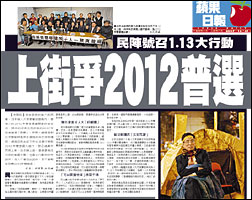
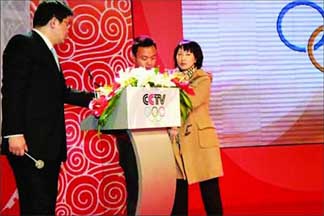
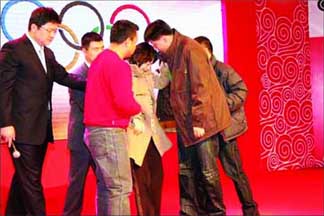


她一扭身伏在車窗上往外看,免得又開過了。車到下一個十字路口方才大轉彎折回。又一個U形大轉彎,從義利餅干行過街到平安戲院,全市唯一的一個清洁的 二輪電影院,灰紅暗黃二色磚砌的門面,有一种針織粗呢的溫暖感,整個建筑圓圓的朝里凹,成為一鉤新月切過路角,門前十分寬敞。對面就是剛才那家凱司令咖啡 館,然后西伯利亞皮貨店,綠屋夫人時裝店,并排兩家四個大櫥窗,華貴的木制模特儿在霓虹燈后擺出各种姿態。隔壁一家小店一比更不起眼,櫥窗里空無一物,招 牌上雖有英文“珠寶商”字樣,也看不出是珠寶店。
Here is Julia Lovell's translation:
She twisted around to look out the window, to tell the chauffeur exactly where to stop. The car made a U-turn at the next crossroads, and then another a little farther on to get back to the Ping'an, the only respectable second-run cinema. The building's dull red façade curved inward like a sickle blade set upon the street corner. Opposite was Commander's K'ai's Cafe again, with the Siberian Leather Goods Store and the Green House Ladies' Clothing Emporium next, each fronted by two large display windows filled with glamorously dressed mannequins bent into all manner of poses beneath neon signs. The next-door establishment was smaller and far more nondescript. Although the sign over the door said JEWELER'S, its single display window was practically empty.
First of all, the bakery 義利餅干行 has been completely disappeared in the translation. The proper name is James Neil & Company (see news365).
The movie house 平安戲院 was translated as the Ping'an. In the movie <Lust, Caution>, Ang Lee did his research and gave it the English name of Uptown.
The restaurant 凱司令 was translated as Commander K'ai's Cafe. But a Google search quickly showed that the proper name is Kaisiling (reference: UDN). Here is a photograph of Kaisiling today:
西伯利亚皮货店 was translated as Siberian Leather Goods Store when it is the Siberian Fur Store (reference: Apple Daily). Another version suggests that it is the First Siberian Leather & Fur Co. Ltd located at 878 Nanjing Road West today (reference: Hong En Chen).
綠屋夫人時裝店 was translated as Green House Ladies' Clothing Emporium when a Google search will quickly yield Madame Greenhouse (reference: news365).
Where are these places? Eileen Chang drew a street map by hand in her letter dated April 16, 1977:
假如香港有普選後的政治生態 都是那些日子[in translation]
There is a paradox at the core of the problem of the development of the political system in Hong Kong: On one hand, the central government won't have the confidence in implementing universal suffrage as long as the political ecology is the same; on the other hand, the political ecology won't change until there is universal suffrage.
The so-called "political ecology" refers to the relative strengths of the various political forces. After more than twenty years (and especially over the last two years), the various political forces in Hong Kong have lined up into two camps: the pro-establishment camp and the opposition camp (these two terms were chosen to illustrate the relationships of the camps towards government, and they carry neither positive nor negative connotations). The relative strengths of these two camps form the principal indicators of the political ecology in Hong Kong. The strengths are determined on the basis of political power, including public opinion support and leadership. By this standard, the pro-establishment camp has always been disadvantaged all along.
When Hong Kong was first returned to China, the pro-establishment camp could not win support by a majority of Hong Kong citizens. The main reason was that the Hong Kong people lacked confidence about "one country, two systems." They did not trust the central and SAR governments. At the time, many Hong Kong people cared more about maintaining the Hong Kong 'system' and making sure that the mainland 'system' does not oppress, assault or erode it. They were worried about conflicts between Hong Kong and mainland. They believed that the pro-establishment camp are vassals of the central government who would line up with the central government and not defend the interests of Hong Kong people whenever a conflict should arise between Hong Kong and mainland.
Today, this is ten years after the return of Hong Kong. Overall, the Hong Kong people have a more positive view about the central government and "one country, two systems." In the past, many people thought that it is necessary to keep a distance away from the mainland in order to keep the Hong Kong advantage. Today, more people believe that Hong Kong must cooperate, even merge, with mainland China in order to use "one country, two systems" to press its advantages. Many Hong Kong people recognize the importance of communicating and working with the central government and they know that constant opposition is pointless.
Yet, this does not mean that many Hong Kong people have switched from supporting the opposition camp to supporting the pro-establishment camp. When a typical Hong Kong person thinks about the relationship between Hong Kong and the central government, he might think: "Even if I do not doubt that the central government is serious about implementing 'one country, two systems' and maintaining the prosperity and stability of Hong Kong, it is ultimately not a democratically elected government. We cannot put all our hopes on the good intentions of the government leaders. When the policies of the central government are consistent with the interests of the people of Hong Kong, we welcome them and the opposition camp would not dare to oppose the public opinion. But whenever a decision by the central government goes against the Hong Kong people's wishes, who will speak up for them? The opposition camp will, but not the pro-establishment camp."
The conclusion then is that there must be a sufficiently powerful opposition camp. If on a certain matter, the opposition camp overstepped in their opposition to the central government, then we won't support them there. But we cannot let the opposition camp be completely marginalized because they are an important check-and-balance force on the central government.
This type of thinking has its logic, especially at a time when universal suffrage has not yet been realized in Hong Kong. When the Chief Executive and some of the seats in the Legislative Council did not come via universal suffrage, people naturally assumed that the political system favors the pro-establishment camp: whether the pro-establishment camp is supported by the system or not, their speech rights are guaranteed; but whether the opposition camp can continue to provide check-and-balance depends on popular support. Such thinking is prevalent in Hong Kong society. As a result, the pro-establishment camp can only continue to be disadvantaged and the political ecology will basically stay unchanged.
If and when universal suffrage is implemented, the fixed boundary between the pro-establishment and opposition camp will disappear after a transitory period. At that time, the citizens will no longer feel that a certain precious animal species known as "the opposition camp" needs special protection. They don't have to worry whether the central government's favorite pet ("the pro-establishment camp") can rule unchecked in Hong Kong. No matter whether someone is "pro-China" or "pro-democracy", "radical" or "conservative," the citizens will simply choose whomever they have the most confidence in ruling Hong Kong. The election winners will become the establishment then. At the next election, if they fail to win the support of the majority of the citizens, they will be turned out and become the opposition. That would be a true transformation of the political ecology.
But this is going to be an event that is somewhat remote in the future. The central government is definitely not going to undertake the foreseeable risks to implement universal suffrage and then patiently watch for the transformation of the political ecology to take place in Hong Kong. Presently, the most pressing problem for the central government is solve the problem of when and how to begin universal suffrage, such that the results of universal suffrage will not be unfavorable to the central government as things stand right now.
Related Link:
馬英九 ) has been embroiled in controversy over his recent and allegedly discriminative remarks about the Aborigines of the Amis tribe in the Sijhou Community (Chinese Nationalist Party (KMT) presidential candidate Ma Ying-jeou (
... When approached for his response, Ma's
campaign spokesman Su Jun-pin (
What exactly did Ma Ying-jeou say? The Taiwan Indigenous TV video clip is posted at YouTube (note: the relevant words appear in the last two minutes). Here is TVBS's transcription (with my translation):
「你既然來到我們的城市,就是我們的人,你來到台北就台北人,我把你當人看,我把你當市民看,要好好把你教育,好好的提供機會給你,我覺得應該這樣子做,所以我覺得原住民的心態,要從那個地方調整,我來到這個地方,我就要照這個地方的遊戲規則來玩。」
(in translation) Since you have come to our city, you are one of our people. If you come to Taipei, then you are a Taipei person. I will treat you like a person, I will treat you as a citizen. I will educate you well, and I will provide good opportunities for you. I feel that this is how it should be done. Thus, I feel that the mindset of the indigenous people needs to be adjusted. When I arrive at a place, I must play under the rules of the games in that place.
You can decide for yourself whether these words carry prejudice and discrimination. But whatever else, there is piece of media-related shenanigan here. According to Liberty Times, the original news broadcast appeared on Taiwan Indigenous TV on December 15. On December 22, the video clip was pointed out at the Ma1dog blog. Shortly afterwards, Taiwan Indigenous TV modified the link to point to an unrelated video clip. However, the video clip was already preserved and replicated at sites such as YouTube.
In the entertainment section of a popular newspaper, there was a disgusting photograph of two granny female actresses donning student uniform and Lolita dress as if they were still lovely teenagers. This disgusting photograph took up one-quarter of the page.
This pair of old ladies don't look pretty to begin with. But would they wear short skirts and act cute? Don't they know how unnatural and ugly they look? Of course, they are free to do so. But couldn't they just do so in a private party and not show the whole world?
... But why did the newspaper editor give one-quarter page to such a disgusting photograph? The editor ought to know that this photograph is going to disturb the readers and cause resentment. Why was the art director thinking when he laid out the page? Did he ever learn about aesthetics? Why did the chief editor think when he saw this page? ...
This news photograph is a milestone of the decay of our society.
... In this society, a small group of people only want to get an instant impact and refuse to think. It is not difficult to imagine the following conversation taking place beforehand:
"For this game show, we need to come up with something big. How can we make some noise?"
"Find a few sexy female stars to don cosplay. Those nerdy guys will love it!"
"Okay, but is there anything more exciting?"
"Hmmm ... Why not get Auntie XXX to play a pretty young girl? She likes to be in the limelight, so she'll definitely do it!"
"Ha ha, good idea!"
"Hey, let's get Elder Sister YYY too and we'll have a pair. We'll find a whole bunch of grandpas and grandmas to play animated characters. This honors the senior citizens and it is fashionable to speak of 'social responsibility'!"
"Good, good! So be it, ha ha."
Everybody applauds and the plan was approved amidst the laughter.
童话:北师大附中校庆中的最无耻记录 新世纪A month before the 114th birthday of Chairman Mao Zedong on December 26, a long forgotten photo of Mao with a young girl resurfaced on the Chinese Internet. It generated an instant furor around the girl.
It has been 41 years since then. She was 18 or 19 at the time, a senior student at the girls' school that was attached to Beijing Normal University. On August 18, 1966, she went to Tiananmen, as part of a delegation of Red Guards to be received by Mao. She was given the special honor of placing a Red Guard armband on Mao’s sleeve. As she did this, Mao asked her name and she told him: Song Binbin. Loosely translated it means “gentle and refined.” Mao had told her in a joking way, according to the photographer, that gentle was out, and "Yaowu" was in. "Yaowu" means "seeking armed conflict."
Almost overnight, the girl became known as Song Yaowu and famous throughout China. Young and proud, little did she know how history is prone to turning fame into infamy. Soon, her new name evolved into a symbol of Red Guard violence, and for a reason.
Just two weeks before this happy moment on Tiananmen, a cruel beating death occurred in Song's school. It was August, and the peak of the three-month activity that marked the beginning of the Cultural Revolution. The Red Guards, mostly middle school and high school students, held power in China second only to Mao. On August 5, in the name of the revolution, teenage girls in Song Binbin's school yelled at and beat up their teachers and administrators.
Bian Zhongyun, the school's Communist Party secretary and vice principal died in the turmoil. History would later record this as the first case of students killing a teacher, something that would shortly thereafter become more frequent nationwide.... Fast-forward four decades. Today, Song Binbin, who goes by this name, has lived a low-key life in the United States for 27 years. On the other side of the earth, in Beijing, her alma mater is celebrating its 90th anniversary. For reasons we don’t know, as part of the celebrations, displayed is a special photo album containing the picture of Song Binbin with Mao. On the opposite page is a picture of Bian Zhongyun, the teacher who had so tragically died at the hands of her students.
Earlier this year, the anniversary had sparked a search for alumnae who made a mark in the world. Song Binbin was among those recommended. She embraced the opportunity with enthusiasm, listing among her achievements her doctoral degree in atmospheric and planetary sciences from the Massachusetts Institute of Technology. She said she was the first doctoral student from China in her department, and provided a picture of herself with her adviser, Fred Frey, a reputed geochemist at MIT.
This appears to be the first time Song Binbin acknowledged her ties to her high school. She had done her best to move away from that time, and always seemed reluctant to talk to anyone about her past. Viewed by most as a villain, and perhaps by history as another fervent believer in a cause gone wrong, she had put the past behind her. That is, until now.
In her write-up of her career, she made no mention of "Red August," 1966. No apology. No justification. Simply nothing. This is a strategy that had been fairly effective in the United States, but her alma mater is not in her adopted land. If she believed her past was forgotten, she was wrong. People saw what she had written, and it generated a furor. Many were outraged that she would hold up her accomplishments in America as if nothing had happened at her high school. They called her the school's shame. They called the school's 90th anniversary celebrations a shame.... In all the years after coming to America, the only time she spoke publicly was in Carma Hinton's recent documentary, "Morning Sun." With her face blurred, Song told the interviewer – and the audience – she had never hit anyone; she had always opposed violence. It was her way of indirectly denying any involvement in Bian Zhongyun 's beating death.
... There is nothing to suggest that Song Binbin was especially fervent in her beliefs, but the picture of herself next to Mao was enough to make her stand out. Unfortunately, the symbol is long-standing, despite being transformed from glorious to notorious; despite Song Binbin and her family becoming victims of the very revolution she had participated in; despite Song spending her adult life as a scientist, shying away from politics.
... So far, few former Red Guards have come out and talked about their actions. Most are in their 60s now, remaining behind a wall of silence. I can understand their excuse that the violence they were involved in was circumstantial, non-personal, and, at the time, even politically correct. Still, I can't help but wonder: Had Song Binbin acknowledged her part in, clarified her position on, and properly expressed her sorrow for that tragic day of 1966, would people's reaction today have been more restrained? Would she have been forgiven by those who crouched in terror that day, as well as by those who had terrorized and now try to forget their shame?
Related Link:


China on Friday denied there had been a new stand-off between residents and authorities in a troubled village where police opened fire on demonstrators protesting against a controversial power plant two years ago. More than 1,000 riot police were sent into Dongzhou village in the southern province of Guangdong to guard a key electricity pylon of the plant and they fired tear gas on Thursday at several hundred protesters, U.S.-funded Radio Free Asia reported.
But Liu Jingmao, spokesman for the Shanwei city government overseeing Dongzhou, put the number of protesters at only "a few dozen" from a "tiny minority" of the villagers. "They were restrained throughout so there hasn't been any clash," Liu told Reuters by telephone. "The construction of the power station and its grid resumed recently. The villagers just wanted to seize this chance to ask for more money," Liu said.... Armed police had set up check points around Dongzhou this week and a "menacing televised announcement" had been broadcast to urge the latest protesters to turn themselves in, Radio Free Asia said, quoting residents.
But Liu, the Shanwei government spokesman, dismissed it as untrue and said no armed police had been involved.
"The overseas reports are completely unfounded. All lawful demands of the villagers have already been met. We will not discuss any unreasonable claims." But he said the completion of the plant had been delayed by the protests for some time and there might still be "unpredictable incidents" before it formally started generating power, which could happen as early as January.The above report is very carefully written, because Reuters did not have first-hand eyewitness information. Therefore, it had to be very careful in presenting both sides in a fair and balanced manner.
Here is Ming Pao's report on the same incident:
... A Dongzhou villager told Ming Pao that more than 1,000 police officers entered the village by force and fired tear gas at the protestors. But the Dongzhou Neighborhood Office and the Dongzhou police station both said that they don't have any details when Ming Pao called them up.
A villager named Mr. Shi told Ming Pao that at least 1,000 armed policemen and public security officers entered the village on Thursday with the construction work crew. On that day, the villagers sounded the alarm off by banging on brass gongs and several hundred of them protested at the village entrance. The police fired tear gas and the villagers dispersed. Several of the protest leaders were arrested, but there was no large-scale clash. The work crew began work under the protection of the police. Mr. Shi said that it is very tense in the village with police everywhere. All the telephones in the villagers are being monitored.
Information from the scene says that the police have set up inspection posts around the village to restrict access. Strangers are examined before they are permitted to enter. The local television station is repeatedly broadcasting a government bulletin to the Dongzhou villagers to tell them that it is against the law to block the construction and they should not prevent the workers from doing their job. The police stayed and watched the construction site through the night.
Related ESWN Link: The Shanwei (Dongzhou) Incident
The world's fifth largest aircraft carrier will be relocating from its current base in Shenzhen to Weizhou, which would bring it closer to the front line of the very tense Taiwan Straits. The Chinese aircraft carrier will have its home base in Double Moon Bay along with a task force of other ships. Meanwhile, there will be a land base that includes training camps, barracks, etc. The new facilities will represent a vast improvement in scale and functionality.
The actual story is as follows:
Once upon a time, the Russian aircraft carrier Minsk was the fifth largest aircraft carrier in the world. Minsk was retired and eventually sold to a company in Shenzhen as the centerpiece of the Citic Minsk World theme park.
Recently, the city of Weizhou made a successful pitch to Citic to relocate Minsk to Double Moon Bay. The Weidong county government has committed to set aside 5,000 mu of land for the new tourist site. When Minsk arrives, there will be a land-based theme park that includes a theme restaurant, a theme commercial street, a five-star hotel and camp grounds. Other ships will probably be brought there too. The new facilities will represent a vast improvement in scale and functionality over the Shenzhen site.



It is near the end of the year and there is a fifth case of netizens being criminally detained because they "insulted" and "libeled" a certain county party secretary (see The Gaotang Three). The first four cases were for SMS poems in Pengshui (Chongqing), an essay in Jishan (Shanxi), a book in Mengzhou (Henan) and a song in Danzhou (Hainan). Although the details of the cases are different, the common characteristic is that the citizens' right to evaluate, discuss and monitor government officials was violated. No matter whether these expressions of opinions went through proper or improper channels; no matter whether these opinions were biased or basically correct; the government officials immediately deemed it libel. The principals were detained, arrested and even paraded publicly. Meanwhile, the state apparatus such as the public security bureaus, the procuratorate and the courts followed the orders of the government officials even though there was no legal basis to take action.
It should be pointed out that these five cases all involved the country party secretary? What is it about county party secretaries? Why do they show up in these kinds of cases? The reason is that the county party secretaries have all the attributes to make these cases. First of all, even though the county secretary is not a high official, he is nevertheless the local "warlord." On his own turf, he is totally dominant and not held accountable by anyone. When his authority is challenged, he has no compunction of hitting back hard. Secondly, he owns the power to make these cases. The whole county moves to his command. If he says so, the public security bureau will find the culprits, the procuratorate will file charges and the court will reach a verdict without delay.
In summary, the county party secretary has huge powers but he is not effectively supervised and monitored. "Apart from foreign diplomacy, military and national defense, their powers are almost identical to the central government." But there is seldom any checks and balance on them. "The supervision from above is too distant, the supervision from persons of the same rank is too weak and the supervision from below is too difficult to do." Such is reality.
The other reason why these cases have shown up repeatedly is that they are treated leniently afterwards. As a result, they have nothing to fear. In the Pengshui case, the county party secretary was transferred laterally; the Jishan case drew the attention of the National People's Congress Standing Committee and was referred to the Shanxi local authorities for investigation without any results; nothing has happened with the Mengzhou and Danzhou cases.
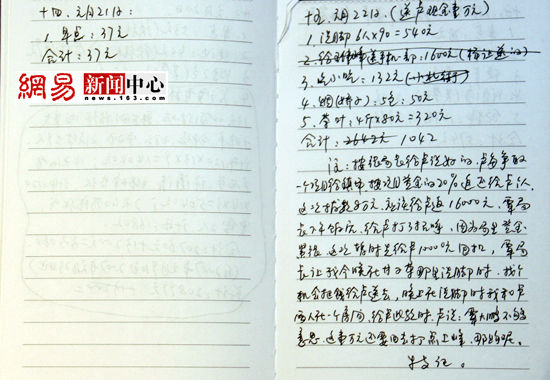
15. January 22. (Gave 10,000yuan in cash to Lu)
1. Foot bathing, 6 persons x 90 = 540 yuan
2. Gave Wang Weifeng a mobile telephone: 1,600 yuan (Yang authorized the gift)
3. Snacks: 132 yuan (Xiaobei Street)
4. Cigarettes (Qiaozi): 5 packs, 50 yuan
5. Tea leaves: 2 kilograms x 160 = 320 yuan
Total:2,642yuan 1,042
Note: According to what director Zhang said, Lu did not complete the project for Zhengping town and therefore he will only get 20% of the amount. If the amount was 80,000 yuan, Lu should get 16,000. But director Tan told Lu during late lunch that money is tight and we are giving him 10,000 yuan for now. In the evening, I was in the same room as Lu when we were getting the foot baths and I gave him the money. Lu said: "Director Tan was not being very generous; this 10,000 yuan has to be used to please the bosses. This is not enough."Lu Xirong is the deputy director of the Shaanxi provincial Forestry Department Wildlife Protection Station and the leader of the South China tiger investigation team. He received a V66 mobile telephone worth 1,680 yuan. When asked about it, he confirmed that he had received the gift which was later stolen. The couny bureau chief Tan Dapeng was more cautious as he is suspected of offering a bribe. Even when told that Lu Xirong had admitted receiving the gift, he denied having done so. Wang Weifeng is the Shaaxi provincial Forestry Department Wildlife and Plant Protection Bureau chief and also a member of the South China tiger investigation team. When asked, Wang denied ever accepting a mobile telephone. Furthermore, he reacted rudely to the reporter's question.
Other goodies in the accounting ledger was that the team smoked sixteen cartons plus six packs of Furongwang cigarettes. The costs for cigarettes, alcohol and tea for the team was 6,472.5 yuan over 20 days; the costs for meals and fruits was 10,685.5 yuan; foot bathing and singing cost 3,030 yuan.
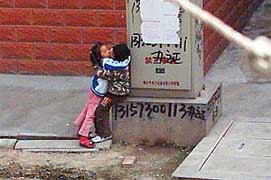
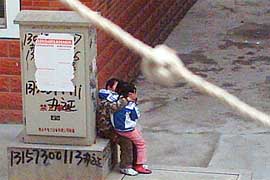
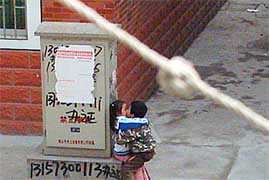
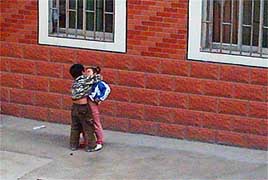
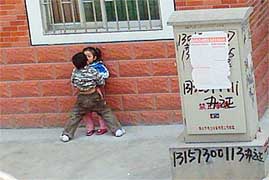
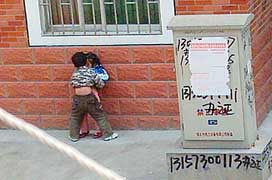


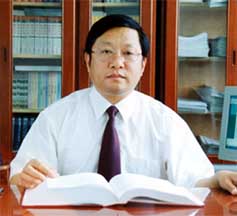
Archives